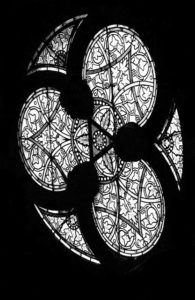I love Trinity Sunday: edgy, powerful, mysterious, provocative Trinity Sunday. It falls, often enough, now in the month of May. It is celebrated on the Sunday following Pentecost.

There is mystery here. Trinity Sunday reminds us that God is beyond our cleverest intellect: who can understand the reality of the ineffable Triune God? There is breathtaking clarity, too. The Creator God of all things, the Ineffable One, the Exalted One, has made himself a Human Being. “Whoever has seen me has seen the Father,” Jesus flatly proclaimed. “I am in the Father and the Father is in me” (John 14:9-10). We need not fret about the inscrutable nature of God. We have seen the Almighty in Jesus.
There is mission in the Trinity, too.
The traditional text for Trinity Sunday is the text of the Great Commission: we are to make disciples of all nations, baptizing them “in the name of the Father, and of the Son, and of the Holy Spirit” (Matthew 28:18-20). Here we find one of the clearest references anywhere to the Triune Heart of God. And mission stands at the very center.
The mission of God is birthed in the Triune Heart of God. The Father is always sending the Son. The Son is always sent. The Spirit is sent by the Father and Son to create the miracle of faith in God’s people – and then to send them, too. The Heart of God is a continual cycle of sending and sacrifice, holy judgment and redeeming love, radical election and spiritual equipment for the sake of God’s mission in the world. The Heart of God is missionary. The people of God become a people in mission, too.
“As the Father has sent me,” Jesus said, “so I send you” (John 20:21). “It is not the church that has a mission of salvation to fulfill in the world,” explains theologian Jürgen Moltmann. “It is the mission of the Son and the Spirit through the Father that includes the church.”[1] This is the “missio Dei” – the “mission of God” – and God has made us a part of it. David Bosch summarizes: “God the Father sending the Son, and God the Father and the Son sending the Spirit” – and then – “Father, Son and Holy Spirit sending the church into the world.”[2]
Now things become edgy.
The fact of the missio Dei means that Christians do not choose, precisely, to become a part of God’s mission in the world – as they might choose a profession, or a place to live, or a pastime to enjoy. The God they serve is always in mission. To know him at all means to be in mission, too.
This means that Christian faith is missionary at its very root. It is not about me or mine, in the first place, or about my satisfaction, my security, my prerogatives, or my happiness or fulfillment. Christians exist because God wants sinners saved. The church exists because God has a world to heal and to redeem. Mission is not a “menu item” from which we may choose, as from a buffet.
This means that human agencies do not exist for themselves, either – not even the agency of the church. We should not think of missions as a “department” of the church, like youth work or a music program. The church (and all that it does) is an instrument of God’s mission in the world.
This means that God calls the shots. The ordained do not own God’s mission. Theologians do not control it. Administrators and bureaucrats (thank God!) do not dispense it at their discretion. No one has a “corner” on Christian mission. This means that God gets the glory, too. God has worked our redemption in Jesus Christ – not for our own satisfaction – but “that in the ages to come he might show the immeasurable riches of his grace in kindness toward us in Christ Jesus” (Ephesians 2:7).
The reality of God’s Triune, missionary heart means that God himself is Author and Perfecter of the entire missionary enterprise.
One of our missionaries recently confessed to me that he doubted the value of his contribution to the cause. He feels sometimes like a failure, I think.
Yet it is not his to evaluate “contribution to the cause.” God is on a mission: he simply invites us along. He authors the mission from the beginning, and may be trusted as well to perfect it. Our own sense of weakness or inadequacy is not measure, nor guarantor, nor restraint to the wonderful mission of God. Who do we think we are, anyway?
I love Trinity Sunday! Every once in a while – one Sunday out of the year, anyway – we should pause to remember the Great Father Eternal, who stands above and behind all things. He has revealed himself once and for all in the Great and Wonderful Redeemer. He renews us and remakes us by the Great Sanctifier. And he sweeps us into his own Great Mission.
2 David Bosch, Transforming Mission. (Maryknoll: Orbis, 1991), p.390.